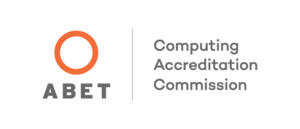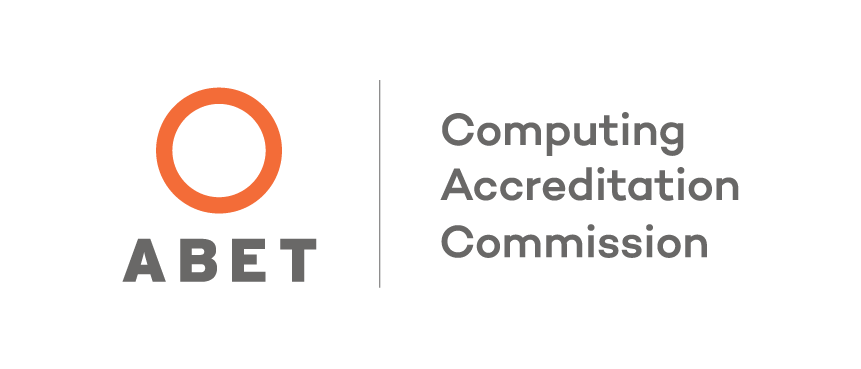Computer Science BS (Metro)

Computer software applications are ubiquitous, benefiting people’s daily lives — from home to school to workplace. The Bachelor of Science (BS) in computer science program prepares graduates for entrance into the high-demand profession of computer science or graduate study. The program graduates work in industry as computer professionals, holding various titles, including computer or data scientist, software developer, apps or web developer, systems or information security analyst, network architect, and system or database administrator.
The program is offered by the Lee Gildart and Oswald Haase School of Computer Sciences and Engineering (GHSCSE) at the Metropolitan Campus, Teaneck, New Jersey. The BS in computer science program is accredited by the Computing Accreditation Commission of ABET. This accreditation applies only to the BS in computer science program offered by the GHSCSE at the Metropolitan Campus, Teaneck, New Jersey.
The computer science discipline focuses on the analysis and development of software systems, and computer science students are trained to program, develop software and solve problems logically, optimally and creatively. These skills are invaluable to any employer and in any field. Since all industries use software, they employ computer science graduates in various capacities and roles. Common job titles include computer, data or research and development scientist; software developer or engineer; apps or web developer; systems or information security analyst; network architect; system or database administrator; and chief information security officer.
The demand for computer professionals far exceeds supply. As such, computer professionals account for many high-paying jobs. The computer science profession is consistently ranked among the very top earners. It has ample and diverse career opportunities, excellent average starting salary, outstanding median long-term salary, robust job growth and great career fulfillment. The demand for computer professionals will further increase as the $1-trillion Infrastructure Investment and Jobs Act, which includes funds for expanding the nation’s broadband networks, is implemented over the next eight years.
The BS in computer science curriculum provides students a varied and balanced educational experience through an appropriate combination of theoretical concepts and practical applications. Students are exposed to a broad range of fundamental concepts in such areas as software engineering, computer organization, database systems, management information systems and operating systems, as well as to a wide variety of computer applications. The core curriculum of required courses are supplemented by contemporary courses in three in-demand fields through three concentrations:
- Big Data Analytics
- Cybersecurity and Information Assurance
- Game and Mobile Application Development
Students select one of the three concentrations for specialization based on their interests and goals. The computer laboratory experience is fully integrated with coursework. Students work in many state-of-the-art laboratories, including the computer networking lab, the cyber defense lab, the apps development lab, and the robotics lab. GHSCSE is a member of the Cisco Networking Academy.
Students completing the BS in computer science program with a concentration in cybersecurity and information assurance are eligible to receive a Certificate of Completion of a National Security Agency (NSA) and Department of Homeland Security (DHS)-designated CAE-CDE program of study from FDU’s Center for Cybersecurity and Information Assurance (CCIA). CAE-CDE denotes the Center for Academic Excellence for Cyber Defense Education.
The program requires the successful completion of at least 120 credits of coursework. Graduates of the program are prepared to work well in virtually all computing environments in various industries. They are familiar with a spectrum of fundamental principles, proficient in the use of modern tools and technology, and have been trained to approach problems with creativity.
Students in the BS in computer science program can also pursue one of the three 4 Plus 1 programs. The three 4 Plus 1 programs are as follows:
- BS in computer science with a pathway to MS in computer science
- BS in computer science with a pathway to MS in cybersecurity and information assurance
- BS in computer science with a pathway to MS in management information system
Professional Accreditation

The B.S. in Computer Science program is accredited by the Computing Accreditation Commission of ABET, https://www.abet.org. This accreditation applies only to the Bachelor of Science in Computer Science program offered by the Gildart Haase School of Computer Sciences and Engineering at the Metropolitan Campus, Teaneck, New Jersey.
Educational Objectives
The program will produce graduates who:
- Utilize a varied and balanced educational experience with an appropriate combination of theoretical knowledge and practical skills that enable entrance into and advancement in the computer science profession.
- Build on educational knowledge and experience to continue formal education and obtain advanced degrees in the fields of computer science, management information systems, business administration, or computer engineering.
- Continue to develop as responsible professionals and global citizens mindful of ethical issues, societal needs, and problems inherent in the computing field.
Student Outcomes
The B.S. in Computer Science program has adopted the Student Outcomes of the Computing Accreditation Commission (CAC) of ABET as its own learning outcomes, which define the attributes, skills, and knowledge that graduates are expected to possess upon or before graduation. Each computer science graduate will have the ability to:
- Analyze a complex computing problem and apply principles of computing and other relevant disciplines to identify solutions.
- Design, implement, and evaluate a computing-based solution to meet a given set of computing requirements in the context of the program’s discipline.
- Communicate effectively in a variety of professional contexts.
- Recognize professional responsibilities and make informed judgments in computing practice based on legal and ethical principles.
- Function effectively as a member or leader of a team engaged in activities appropriate to the program’s discipline.
- Apply computer science theory and software development fundamentals to produce computing-based solutions. [CS]
Degree Plan
1st Semester (14 credits)
- CSCI1201 Computer Programming I
- ENGR2286 Digital System Design
- WRIT1002 Composition I: Rhetoric and Inquiry
- MATH1201 Calculus I
- UNIV1001 Transitioning to University Life
2nd Semester (14 credits)
- CSCI1202 Computer Programming II
- CSCI2215 Introduction to Computer Science
- WRIT1003 Composition II: Research and Argument
- MATH2202 Calculus II
- UNIV1002 Preparing for Professional Life
3rd Semester (16 credits)
- CSCI2234 Data Structures and Algorithms
- CSCI2247 Assembly Language Programming
- PHYS2201 University Physics 1 Lab
- PHYS2203 University Physics 1 Lecture
- UNIV2001 Cross-cultural Perspectives
- ENGR2210 Technical Communication
4th Semester (16 credits)
- CSCI3268 Database Systems
- MATH3237 Probability and Statistics I
- PHYS2204 University Physics II Lecture
- PHYS2202 University Physics II Lab
- UNIV2002 Global Issues
- CSCI2235 Survey of Computing Security
5th Semester (15 credits)
- CSCI3240 Computer Networks
- MATH2255 Discrete Structures
- CSCI3278 Operating Systems
- ENGR3000 Modern Tech: Principles, App, and Impacts
- Humanities elective
6th Semester (15 credits)
7th Semester (16 credits)
- Concentration
- Technical electives (6 credits)
- CSCI4384 Prep for senior project
- ENGR4210 Managerial and Economic Analysis
- CSCI3249 Computer Organization
8th Semester (14 credits)
- Concentration (6 credits):
- Technical elective
- CSCI3260 Mathematical Foundations of Computer Science
- CSCI4386 CS Senior Project
Concentration Requirements, 15 credits
Students must complete any one of three concentration areas: Cybersecurity and Information Assurance, Big Data Analytics, and Game and Mobile Application Development. Each concentration requires the successful completion of five courses (15 credits). Students completing the BS in Computer Science with a concentration in the Cybersecurity and Information Assurance concentration are eligible to receive a Certificate of Completion of an NSA & DHS designated CAE-CDE program of study from FDU’s Center for Cybersecurity and Information Assurance (CCIA). Students pursuing a concentration in Game and Mobile Application Development are recommended to take two computer animation courses from the School of Art and Media Studies as a Free Elective and a Technical Elective in the B.S. Computer Science curriculum.
Cybersecurity and Information Assurance
- CSCI3274 Linux System Administration (3 credits)
- CSCI3345 Firewalls and Intrusion Detection Systems (3 credits)
- CSCI3410 Foundations of Cybersecurity (3 credits)
- CSCI3420 Cryptography (3 credits)
- CSCI3783 Information Security (3 credits
Cybersecurity and Information Assurance Student Outcomes
The B.S. Computer Science graduates with a concentration in cybersecurity and information assurance will additionally have the ability to:
- Apply security principles and practices to maintain operations in the presence of risks and threats. [CY]
- Assess vulnerabilities of components, connections, and systems for data protection, privacy, and threat mitigation.
Big Data Analytics
- CSCI3331 Advanced Database
- CSCI3318 Cloud Computing
- CSCI3387 Machine Learning
- CSCI3461 Data Mining and Applications
- CSCI3485 Big Data Analytics
Big Data Analytics Student Outcomes
The B.S. Computer Science graduates with a concentration in big data analytics will additionally have the ability to:
- Analyze data analytics algorithms and Big Data analytics frameworks.
- Apply data and Big Data analytics methods to projects and products.
Game and Mobile Application Development
- CSCI3314 Mobile Application Development (3 credits)
- CSCI3317 Computer Game Programming (3 credits)
- CSCI3444 Programming for the Internet (3 credits)
- CSCI3385 Artificial Intelligence (3 credits)
- CSCI3387 Machine Learning (3 credits)
Game and Mobile Application Development Student Outcomes
The B.S. Computer Science graduates with a concentration in game & mobile application development will additionally have the ability to:
- Apply multimedia data processing algorithms
- Develop applications on different platforms
Program Enrollment and Degree Data
The official fall term enrollments of the B.S. in Computer Science program for the last five academic years and the number of degrees conferred during each of those years.
|
|
Academic Year |
Enrollment Year |
Total
|
Degrees Awarded |
|||||
|
1st |
2nd |
3rd |
4th |
|
|
||||
|
Current Year |
2025-2024 |
FT |
29 |
24 |
17 |
15 |
85 |
Not yet available |
|
|
PT |
|
1 |
|
|
1 |
||||
|
1
|
2024-2023 |
FT |
44 |
25 |
14 |
15 |
98 |
12 |
|
|
PT |
1 |
1 |
|
1 |
3 |
||||
|
2
|
2023-2022 |
FT |
46 |
16 |
18 |
12 |
92 |
14 |
|
|
PT |
2 |
|
3 |
5 |
|||||
|
3
|
2022-2021 |
FT |
29 |
21 |
12 |
11 |
73 |
12 |
|
|
PT |
1 |
|
|
1 |
2 |
||||
|
4
|
2021-2020 |
FT |
31 |
25 |
13 |
15 |
84 |
12 |
|
|
PT |
|
1 |
|
|
1 |
||||
FT- full time
PT- part time
